Sociology Assignment: Inclusive Learning in Early Childhood
VerifiedAdded on 2022/10/02
|12
|4220
|247
Essay
AI Summary
This sociology assignment explores the multifaceted concept of inclusive learning within early childhood education. The assignment begins by defining the student's perspective on inclusion and early intervention, emphasizing the importance of involving every child in the learning process to foster comprehensive development. It then delves into Australian legislation and policies that support inclusive practices, such as the Disability Discrimination Act and the Age Discrimination Act, highlighting their roles in ensuring equal opportunities for all children. The assignment further examines developmental theories, particularly Bronfenbrenner's bioecological theory, to enhance the understanding of inclusive early childhood practices. The student also reflects on practical strategies adopted to promote inclusive learning, such as encouraging open participation, providing individualized support, and implementing seat rotations to facilitate interaction among students. The assignment references key literature and provides insights into the challenges and benefits of inclusive education within the Australian context.
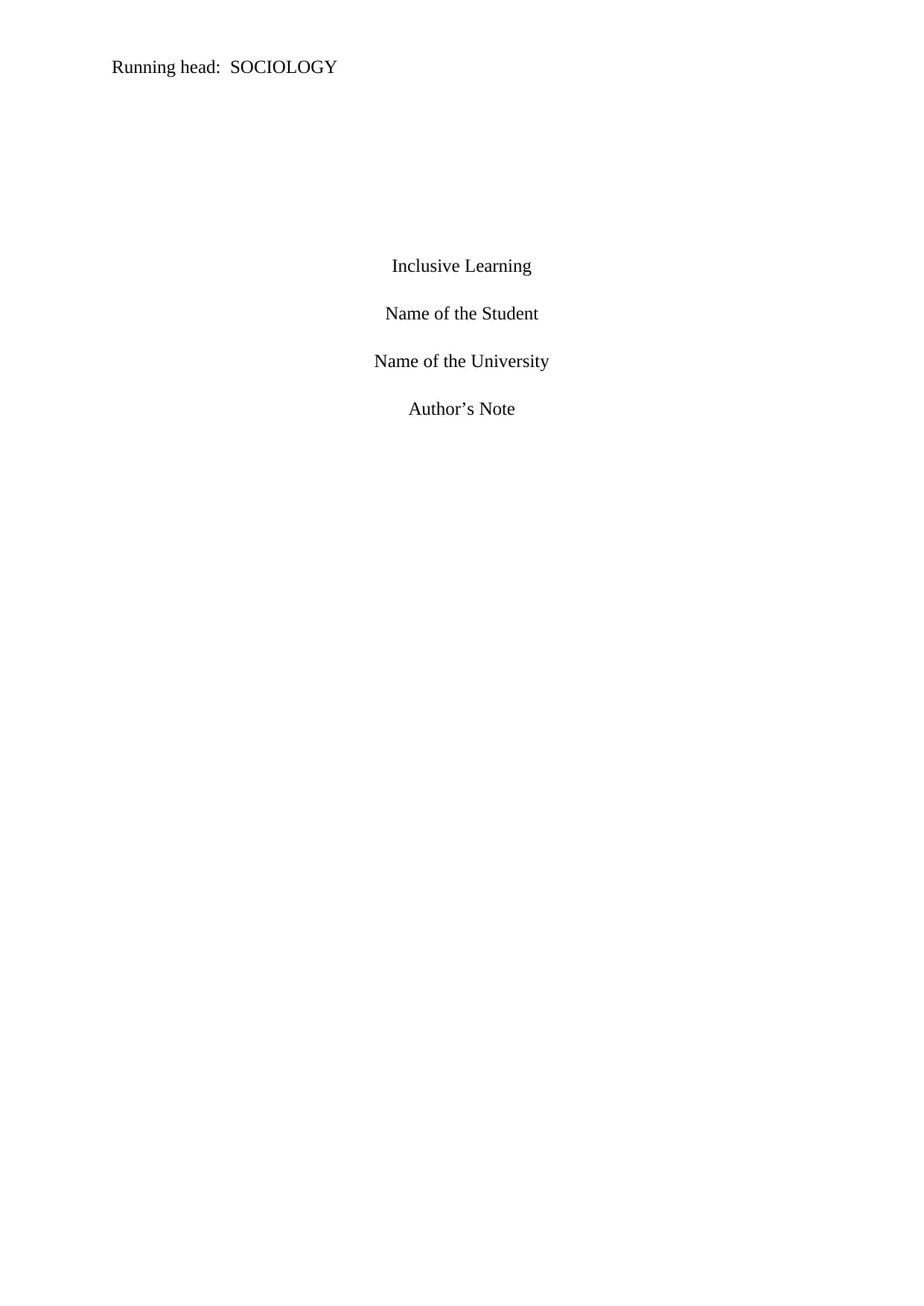
Running head: SOCIOLOGY
Inclusive Learning
Name of the Student
Name of the University
Author’s Note
Inclusive Learning
Name of the Student
Name of the University
Author’s Note
Paraphrase This Document
Need a fresh take? Get an instant paraphrase of this document with our AI Paraphraser
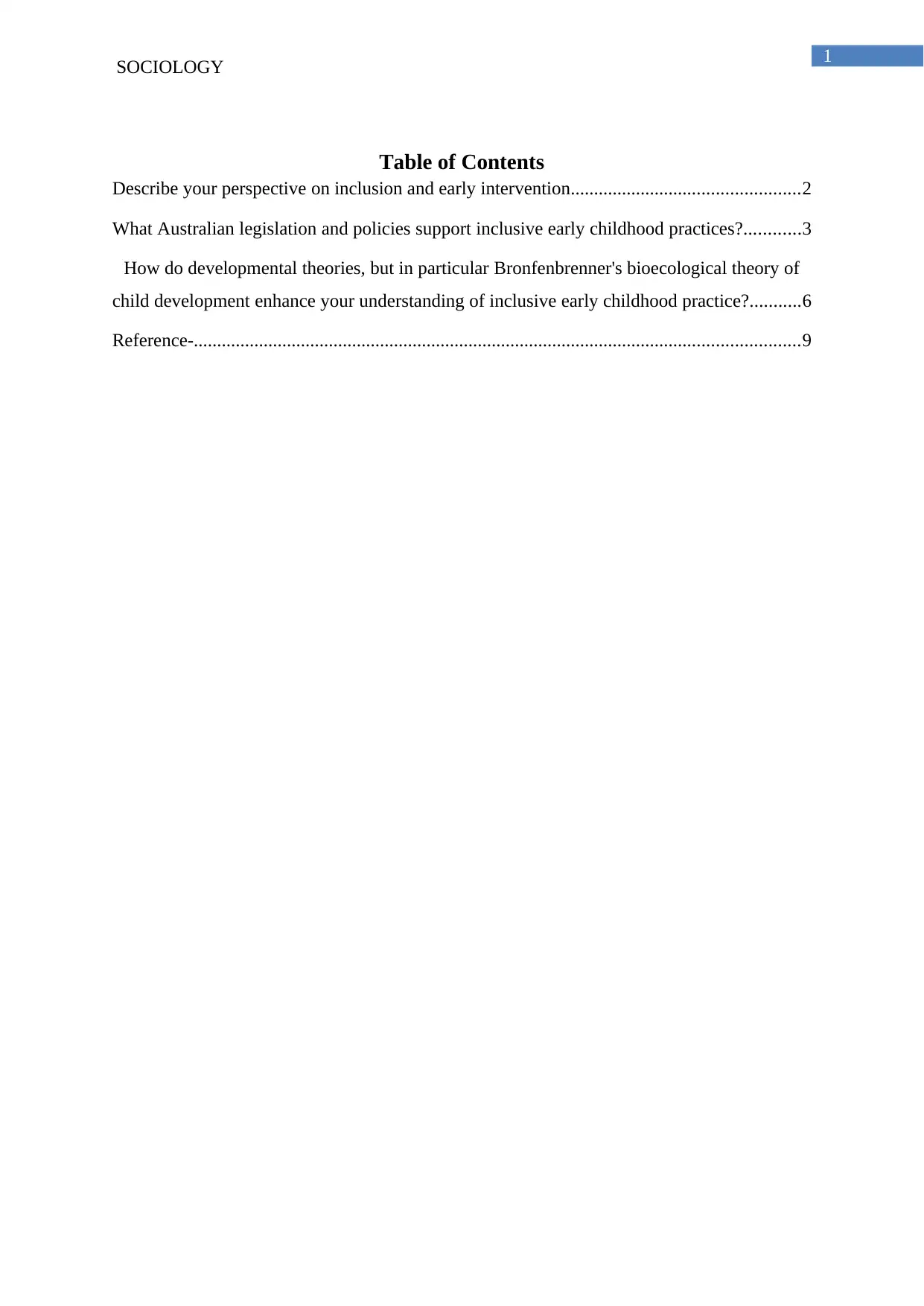
1
SOCIOLOGY
Table of Contents
Describe your perspective on inclusion and early intervention.................................................2
What Australian legislation and policies support inclusive early childhood practices?............3
How do developmental theories, but in particular Bronfenbrenner's bioecological theory of
child development enhance your understanding of inclusive early childhood practice?...........6
Reference-..................................................................................................................................9
SOCIOLOGY
Table of Contents
Describe your perspective on inclusion and early intervention.................................................2
What Australian legislation and policies support inclusive early childhood practices?............3
How do developmental theories, but in particular Bronfenbrenner's bioecological theory of
child development enhance your understanding of inclusive early childhood practice?...........6
Reference-..................................................................................................................................9
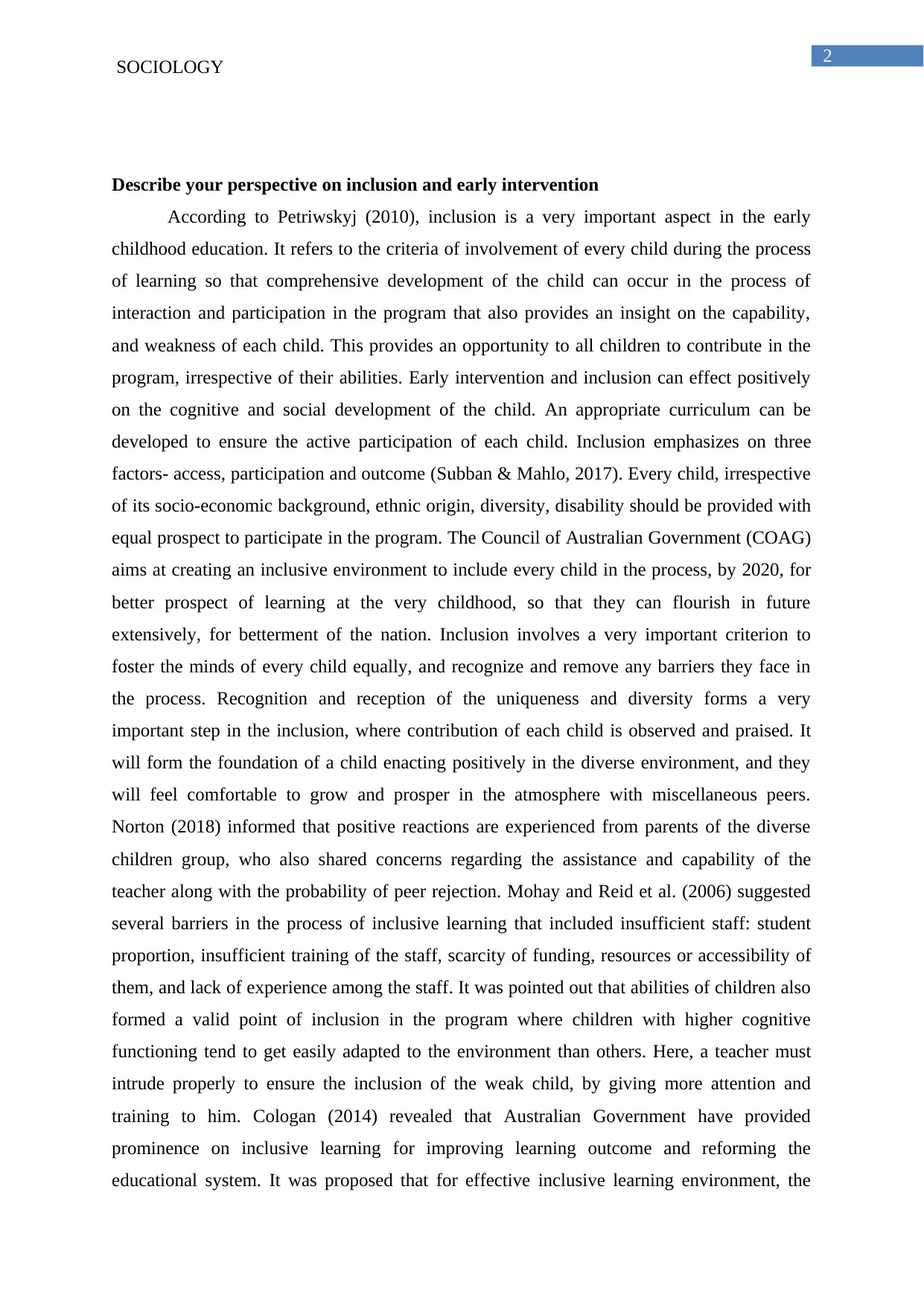
2
SOCIOLOGY
Describe your perspective on inclusion and early intervention
According to Petriwskyj (2010), inclusion is a very important aspect in the early
childhood education. It refers to the criteria of involvement of every child during the process
of learning so that comprehensive development of the child can occur in the process of
interaction and participation in the program that also provides an insight on the capability,
and weakness of each child. This provides an opportunity to all children to contribute in the
program, irrespective of their abilities. Early intervention and inclusion can effect positively
on the cognitive and social development of the child. An appropriate curriculum can be
developed to ensure the active participation of each child. Inclusion emphasizes on three
factors- access, participation and outcome (Subban & Mahlo, 2017). Every child, irrespective
of its socio-economic background, ethnic origin, diversity, disability should be provided with
equal prospect to participate in the program. The Council of Australian Government (COAG)
aims at creating an inclusive environment to include every child in the process, by 2020, for
better prospect of learning at the very childhood, so that they can flourish in future
extensively, for betterment of the nation. Inclusion involves a very important criterion to
foster the minds of every child equally, and recognize and remove any barriers they face in
the process. Recognition and reception of the uniqueness and diversity forms a very
important step in the inclusion, where contribution of each child is observed and praised. It
will form the foundation of a child enacting positively in the diverse environment, and they
will feel comfortable to grow and prosper in the atmosphere with miscellaneous peers.
Norton (2018) informed that positive reactions are experienced from parents of the diverse
children group, who also shared concerns regarding the assistance and capability of the
teacher along with the probability of peer rejection. Mohay and Reid et al. (2006) suggested
several barriers in the process of inclusive learning that included insufficient staff: student
proportion, insufficient training of the staff, scarcity of funding, resources or accessibility of
them, and lack of experience among the staff. It was pointed out that abilities of children also
formed a valid point of inclusion in the program where children with higher cognitive
functioning tend to get easily adapted to the environment than others. Here, a teacher must
intrude properly to ensure the inclusion of the weak child, by giving more attention and
training to him. Cologan (2014) revealed that Australian Government have provided
prominence on inclusive learning for improving learning outcome and reforming the
educational system. It was proposed that for effective inclusive learning environment, the
SOCIOLOGY
Describe your perspective on inclusion and early intervention
According to Petriwskyj (2010), inclusion is a very important aspect in the early
childhood education. It refers to the criteria of involvement of every child during the process
of learning so that comprehensive development of the child can occur in the process of
interaction and participation in the program that also provides an insight on the capability,
and weakness of each child. This provides an opportunity to all children to contribute in the
program, irrespective of their abilities. Early intervention and inclusion can effect positively
on the cognitive and social development of the child. An appropriate curriculum can be
developed to ensure the active participation of each child. Inclusion emphasizes on three
factors- access, participation and outcome (Subban & Mahlo, 2017). Every child, irrespective
of its socio-economic background, ethnic origin, diversity, disability should be provided with
equal prospect to participate in the program. The Council of Australian Government (COAG)
aims at creating an inclusive environment to include every child in the process, by 2020, for
better prospect of learning at the very childhood, so that they can flourish in future
extensively, for betterment of the nation. Inclusion involves a very important criterion to
foster the minds of every child equally, and recognize and remove any barriers they face in
the process. Recognition and reception of the uniqueness and diversity forms a very
important step in the inclusion, where contribution of each child is observed and praised. It
will form the foundation of a child enacting positively in the diverse environment, and they
will feel comfortable to grow and prosper in the atmosphere with miscellaneous peers.
Norton (2018) informed that positive reactions are experienced from parents of the diverse
children group, who also shared concerns regarding the assistance and capability of the
teacher along with the probability of peer rejection. Mohay and Reid et al. (2006) suggested
several barriers in the process of inclusive learning that included insufficient staff: student
proportion, insufficient training of the staff, scarcity of funding, resources or accessibility of
them, and lack of experience among the staff. It was pointed out that abilities of children also
formed a valid point of inclusion in the program where children with higher cognitive
functioning tend to get easily adapted to the environment than others. Here, a teacher must
intrude properly to ensure the inclusion of the weak child, by giving more attention and
training to him. Cologan (2014) revealed that Australian Government have provided
prominence on inclusive learning for improving learning outcome and reforming the
educational system. It was proposed that for effective inclusive learning environment, the
⊘ This is a preview!⊘
Do you want full access?
Subscribe today to unlock all pages.

Trusted by 1+ million students worldwide
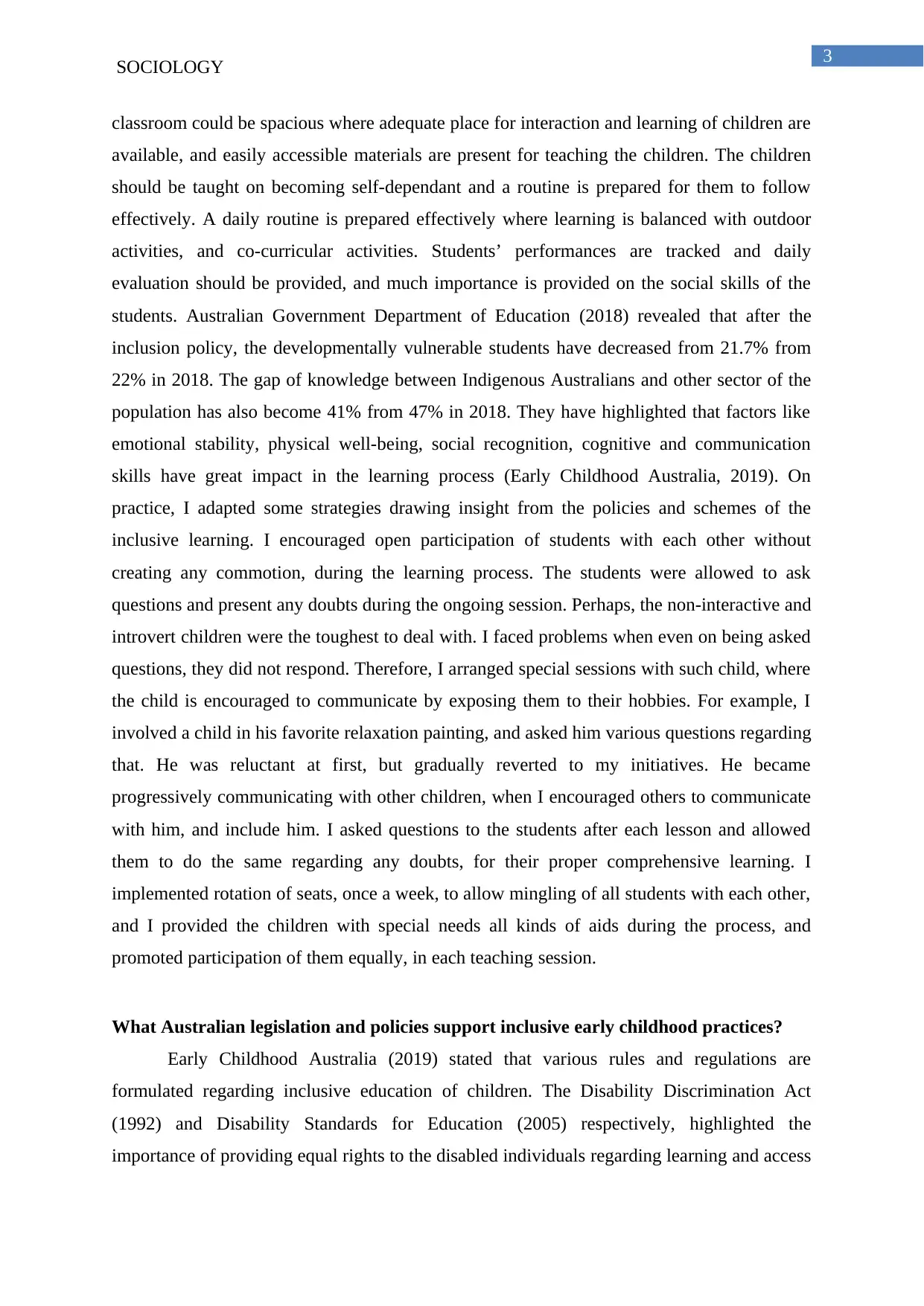
3
SOCIOLOGY
classroom could be spacious where adequate place for interaction and learning of children are
available, and easily accessible materials are present for teaching the children. The children
should be taught on becoming self-dependant and a routine is prepared for them to follow
effectively. A daily routine is prepared effectively where learning is balanced with outdoor
activities, and co-curricular activities. Students’ performances are tracked and daily
evaluation should be provided, and much importance is provided on the social skills of the
students. Australian Government Department of Education (2018) revealed that after the
inclusion policy, the developmentally vulnerable students have decreased from 21.7% from
22% in 2018. The gap of knowledge between Indigenous Australians and other sector of the
population has also become 41% from 47% in 2018. They have highlighted that factors like
emotional stability, physical well-being, social recognition, cognitive and communication
skills have great impact in the learning process (Early Childhood Australia, 2019). On
practice, I adapted some strategies drawing insight from the policies and schemes of the
inclusive learning. I encouraged open participation of students with each other without
creating any commotion, during the learning process. The students were allowed to ask
questions and present any doubts during the ongoing session. Perhaps, the non-interactive and
introvert children were the toughest to deal with. I faced problems when even on being asked
questions, they did not respond. Therefore, I arranged special sessions with such child, where
the child is encouraged to communicate by exposing them to their hobbies. For example, I
involved a child in his favorite relaxation painting, and asked him various questions regarding
that. He was reluctant at first, but gradually reverted to my initiatives. He became
progressively communicating with other children, when I encouraged others to communicate
with him, and include him. I asked questions to the students after each lesson and allowed
them to do the same regarding any doubts, for their proper comprehensive learning. I
implemented rotation of seats, once a week, to allow mingling of all students with each other,
and I provided the children with special needs all kinds of aids during the process, and
promoted participation of them equally, in each teaching session.
What Australian legislation and policies support inclusive early childhood practices?
Early Childhood Australia (2019) stated that various rules and regulations are
formulated regarding inclusive education of children. The Disability Discrimination Act
(1992) and Disability Standards for Education (2005) respectively, highlighted the
importance of providing equal rights to the disabled individuals regarding learning and access
SOCIOLOGY
classroom could be spacious where adequate place for interaction and learning of children are
available, and easily accessible materials are present for teaching the children. The children
should be taught on becoming self-dependant and a routine is prepared for them to follow
effectively. A daily routine is prepared effectively where learning is balanced with outdoor
activities, and co-curricular activities. Students’ performances are tracked and daily
evaluation should be provided, and much importance is provided on the social skills of the
students. Australian Government Department of Education (2018) revealed that after the
inclusion policy, the developmentally vulnerable students have decreased from 21.7% from
22% in 2018. The gap of knowledge between Indigenous Australians and other sector of the
population has also become 41% from 47% in 2018. They have highlighted that factors like
emotional stability, physical well-being, social recognition, cognitive and communication
skills have great impact in the learning process (Early Childhood Australia, 2019). On
practice, I adapted some strategies drawing insight from the policies and schemes of the
inclusive learning. I encouraged open participation of students with each other without
creating any commotion, during the learning process. The students were allowed to ask
questions and present any doubts during the ongoing session. Perhaps, the non-interactive and
introvert children were the toughest to deal with. I faced problems when even on being asked
questions, they did not respond. Therefore, I arranged special sessions with such child, where
the child is encouraged to communicate by exposing them to their hobbies. For example, I
involved a child in his favorite relaxation painting, and asked him various questions regarding
that. He was reluctant at first, but gradually reverted to my initiatives. He became
progressively communicating with other children, when I encouraged others to communicate
with him, and include him. I asked questions to the students after each lesson and allowed
them to do the same regarding any doubts, for their proper comprehensive learning. I
implemented rotation of seats, once a week, to allow mingling of all students with each other,
and I provided the children with special needs all kinds of aids during the process, and
promoted participation of them equally, in each teaching session.
What Australian legislation and policies support inclusive early childhood practices?
Early Childhood Australia (2019) stated that various rules and regulations are
formulated regarding inclusive education of children. The Disability Discrimination Act
(1992) and Disability Standards for Education (2005) respectively, highlighted the
importance of providing equal rights to the disabled individuals regarding learning and access
Paraphrase This Document
Need a fresh take? Get an instant paraphrase of this document with our AI Paraphraser
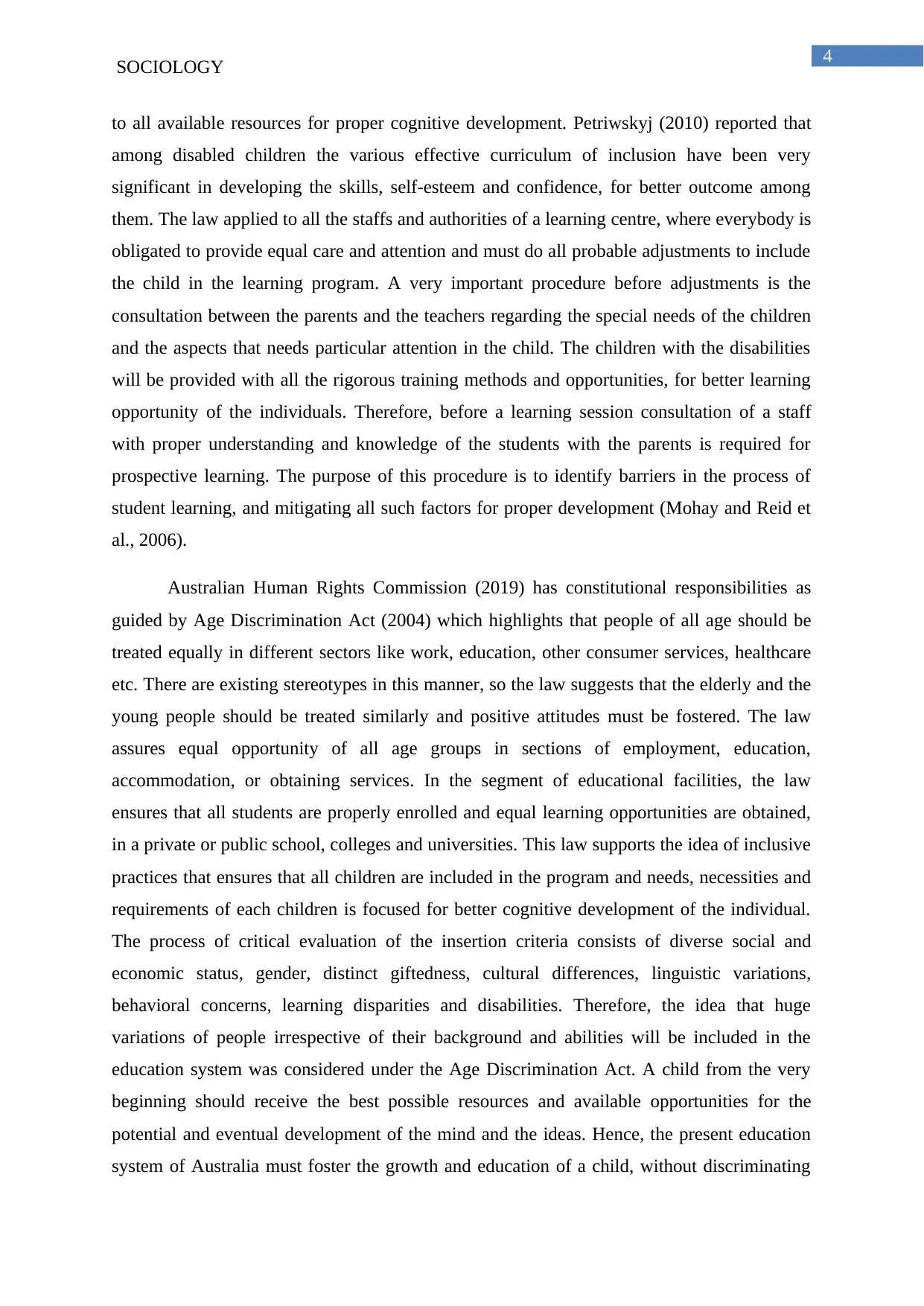
4
SOCIOLOGY
to all available resources for proper cognitive development. Petriwskyj (2010) reported that
among disabled children the various effective curriculum of inclusion have been very
significant in developing the skills, self-esteem and confidence, for better outcome among
them. The law applied to all the staffs and authorities of a learning centre, where everybody is
obligated to provide equal care and attention and must do all probable adjustments to include
the child in the learning program. A very important procedure before adjustments is the
consultation between the parents and the teachers regarding the special needs of the children
and the aspects that needs particular attention in the child. The children with the disabilities
will be provided with all the rigorous training methods and opportunities, for better learning
opportunity of the individuals. Therefore, before a learning session consultation of a staff
with proper understanding and knowledge of the students with the parents is required for
prospective learning. The purpose of this procedure is to identify barriers in the process of
student learning, and mitigating all such factors for proper development (Mohay and Reid et
al., 2006).
Australian Human Rights Commission (2019) has constitutional responsibilities as
guided by Age Discrimination Act (2004) which highlights that people of all age should be
treated equally in different sectors like work, education, other consumer services, healthcare
etc. There are existing stereotypes in this manner, so the law suggests that the elderly and the
young people should be treated similarly and positive attitudes must be fostered. The law
assures equal opportunity of all age groups in sections of employment, education,
accommodation, or obtaining services. In the segment of educational facilities, the law
ensures that all students are properly enrolled and equal learning opportunities are obtained,
in a private or public school, colleges and universities. This law supports the idea of inclusive
practices that ensures that all children are included in the program and needs, necessities and
requirements of each children is focused for better cognitive development of the individual.
The process of critical evaluation of the insertion criteria consists of diverse social and
economic status, gender, distinct giftedness, cultural differences, linguistic variations,
behavioral concerns, learning disparities and disabilities. Therefore, the idea that huge
variations of people irrespective of their background and abilities will be included in the
education system was considered under the Age Discrimination Act. A child from the very
beginning should receive the best possible resources and available opportunities for the
potential and eventual development of the mind and the ideas. Hence, the present education
system of Australia must foster the growth and education of a child, without discriminating
SOCIOLOGY
to all available resources for proper cognitive development. Petriwskyj (2010) reported that
among disabled children the various effective curriculum of inclusion have been very
significant in developing the skills, self-esteem and confidence, for better outcome among
them. The law applied to all the staffs and authorities of a learning centre, where everybody is
obligated to provide equal care and attention and must do all probable adjustments to include
the child in the learning program. A very important procedure before adjustments is the
consultation between the parents and the teachers regarding the special needs of the children
and the aspects that needs particular attention in the child. The children with the disabilities
will be provided with all the rigorous training methods and opportunities, for better learning
opportunity of the individuals. Therefore, before a learning session consultation of a staff
with proper understanding and knowledge of the students with the parents is required for
prospective learning. The purpose of this procedure is to identify barriers in the process of
student learning, and mitigating all such factors for proper development (Mohay and Reid et
al., 2006).
Australian Human Rights Commission (2019) has constitutional responsibilities as
guided by Age Discrimination Act (2004) which highlights that people of all age should be
treated equally in different sectors like work, education, other consumer services, healthcare
etc. There are existing stereotypes in this manner, so the law suggests that the elderly and the
young people should be treated similarly and positive attitudes must be fostered. The law
assures equal opportunity of all age groups in sections of employment, education,
accommodation, or obtaining services. In the segment of educational facilities, the law
ensures that all students are properly enrolled and equal learning opportunities are obtained,
in a private or public school, colleges and universities. This law supports the idea of inclusive
practices that ensures that all children are included in the program and needs, necessities and
requirements of each children is focused for better cognitive development of the individual.
The process of critical evaluation of the insertion criteria consists of diverse social and
economic status, gender, distinct giftedness, cultural differences, linguistic variations,
behavioral concerns, learning disparities and disabilities. Therefore, the idea that huge
variations of people irrespective of their background and abilities will be included in the
education system was considered under the Age Discrimination Act. A child from the very
beginning should receive the best possible resources and available opportunities for the
potential and eventual development of the mind and the ideas. Hence, the present education
system of Australia must foster the growth and education of a child, without discriminating
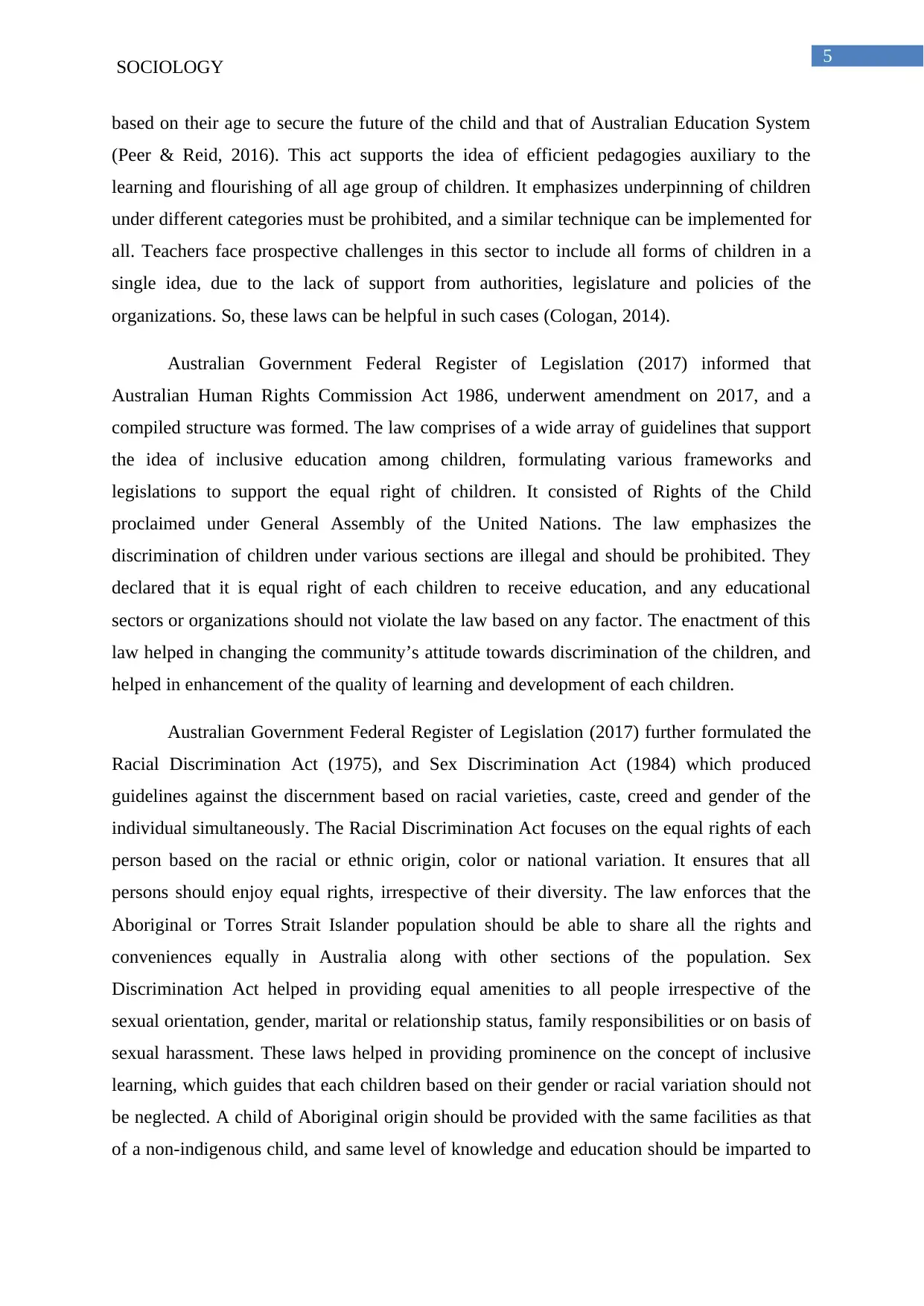
5
SOCIOLOGY
based on their age to secure the future of the child and that of Australian Education System
(Peer & Reid, 2016). This act supports the idea of efficient pedagogies auxiliary to the
learning and flourishing of all age group of children. It emphasizes underpinning of children
under different categories must be prohibited, and a similar technique can be implemented for
all. Teachers face prospective challenges in this sector to include all forms of children in a
single idea, due to the lack of support from authorities, legislature and policies of the
organizations. So, these laws can be helpful in such cases (Cologan, 2014).
Australian Government Federal Register of Legislation (2017) informed that
Australian Human Rights Commission Act 1986, underwent amendment on 2017, and a
compiled structure was formed. The law comprises of a wide array of guidelines that support
the idea of inclusive education among children, formulating various frameworks and
legislations to support the equal right of children. It consisted of Rights of the Child
proclaimed under General Assembly of the United Nations. The law emphasizes the
discrimination of children under various sections are illegal and should be prohibited. They
declared that it is equal right of each children to receive education, and any educational
sectors or organizations should not violate the law based on any factor. The enactment of this
law helped in changing the community’s attitude towards discrimination of the children, and
helped in enhancement of the quality of learning and development of each children.
Australian Government Federal Register of Legislation (2017) further formulated the
Racial Discrimination Act (1975), and Sex Discrimination Act (1984) which produced
guidelines against the discernment based on racial varieties, caste, creed and gender of the
individual simultaneously. The Racial Discrimination Act focuses on the equal rights of each
person based on the racial or ethnic origin, color or national variation. It ensures that all
persons should enjoy equal rights, irrespective of their diversity. The law enforces that the
Aboriginal or Torres Strait Islander population should be able to share all the rights and
conveniences equally in Australia along with other sections of the population. Sex
Discrimination Act helped in providing equal amenities to all people irrespective of the
sexual orientation, gender, marital or relationship status, family responsibilities or on basis of
sexual harassment. These laws helped in providing prominence on the concept of inclusive
learning, which guides that each children based on their gender or racial variation should not
be neglected. A child of Aboriginal origin should be provided with the same facilities as that
of a non-indigenous child, and same level of knowledge and education should be imparted to
SOCIOLOGY
based on their age to secure the future of the child and that of Australian Education System
(Peer & Reid, 2016). This act supports the idea of efficient pedagogies auxiliary to the
learning and flourishing of all age group of children. It emphasizes underpinning of children
under different categories must be prohibited, and a similar technique can be implemented for
all. Teachers face prospective challenges in this sector to include all forms of children in a
single idea, due to the lack of support from authorities, legislature and policies of the
organizations. So, these laws can be helpful in such cases (Cologan, 2014).
Australian Government Federal Register of Legislation (2017) informed that
Australian Human Rights Commission Act 1986, underwent amendment on 2017, and a
compiled structure was formed. The law comprises of a wide array of guidelines that support
the idea of inclusive education among children, formulating various frameworks and
legislations to support the equal right of children. It consisted of Rights of the Child
proclaimed under General Assembly of the United Nations. The law emphasizes the
discrimination of children under various sections are illegal and should be prohibited. They
declared that it is equal right of each children to receive education, and any educational
sectors or organizations should not violate the law based on any factor. The enactment of this
law helped in changing the community’s attitude towards discrimination of the children, and
helped in enhancement of the quality of learning and development of each children.
Australian Government Federal Register of Legislation (2017) further formulated the
Racial Discrimination Act (1975), and Sex Discrimination Act (1984) which produced
guidelines against the discernment based on racial varieties, caste, creed and gender of the
individual simultaneously. The Racial Discrimination Act focuses on the equal rights of each
person based on the racial or ethnic origin, color or national variation. It ensures that all
persons should enjoy equal rights, irrespective of their diversity. The law enforces that the
Aboriginal or Torres Strait Islander population should be able to share all the rights and
conveniences equally in Australia along with other sections of the population. Sex
Discrimination Act helped in providing equal amenities to all people irrespective of the
sexual orientation, gender, marital or relationship status, family responsibilities or on basis of
sexual harassment. These laws helped in providing prominence on the concept of inclusive
learning, which guides that each children based on their gender or racial variation should not
be neglected. A child of Aboriginal origin should be provided with the same facilities as that
of a non-indigenous child, and same level of knowledge and education should be imparted to
⊘ This is a preview!⊘
Do you want full access?
Subscribe today to unlock all pages.

Trusted by 1+ million students worldwide
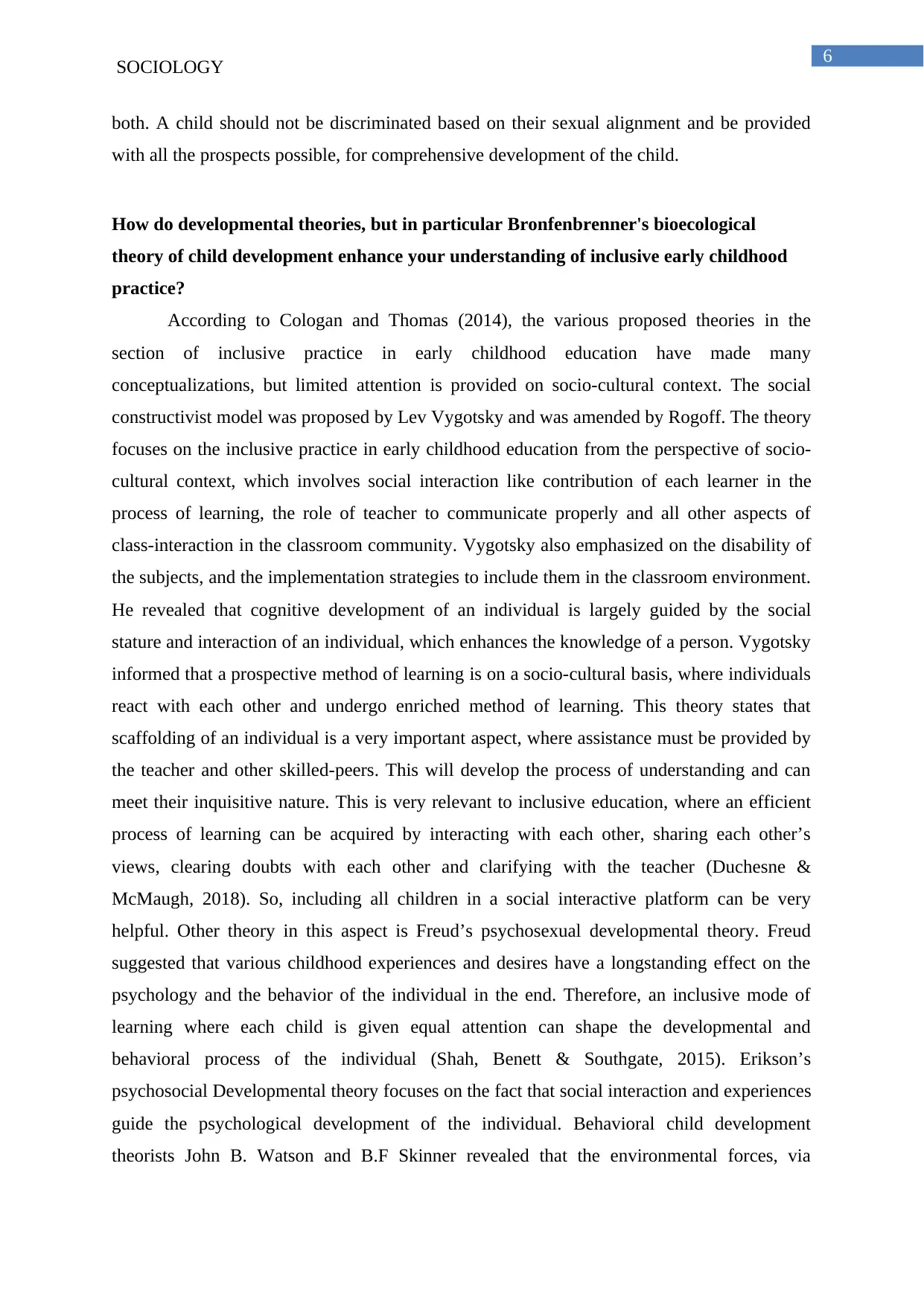
6
SOCIOLOGY
both. A child should not be discriminated based on their sexual alignment and be provided
with all the prospects possible, for comprehensive development of the child.
How do developmental theories, but in particular Bronfenbrenner's bioecological
theory of child development enhance your understanding of inclusive early childhood
practice?
According to Cologan and Thomas (2014), the various proposed theories in the
section of inclusive practice in early childhood education have made many
conceptualizations, but limited attention is provided on socio-cultural context. The social
constructivist model was proposed by Lev Vygotsky and was amended by Rogoff. The theory
focuses on the inclusive practice in early childhood education from the perspective of socio-
cultural context, which involves social interaction like contribution of each learner in the
process of learning, the role of teacher to communicate properly and all other aspects of
class-interaction in the classroom community. Vygotsky also emphasized on the disability of
the subjects, and the implementation strategies to include them in the classroom environment.
He revealed that cognitive development of an individual is largely guided by the social
stature and interaction of an individual, which enhances the knowledge of a person. Vygotsky
informed that a prospective method of learning is on a socio-cultural basis, where individuals
react with each other and undergo enriched method of learning. This theory states that
scaffolding of an individual is a very important aspect, where assistance must be provided by
the teacher and other skilled-peers. This will develop the process of understanding and can
meet their inquisitive nature. This is very relevant to inclusive education, where an efficient
process of learning can be acquired by interacting with each other, sharing each other’s
views, clearing doubts with each other and clarifying with the teacher (Duchesne &
McMaugh, 2018). So, including all children in a social interactive platform can be very
helpful. Other theory in this aspect is Freud’s psychosexual developmental theory. Freud
suggested that various childhood experiences and desires have a longstanding effect on the
psychology and the behavior of the individual in the end. Therefore, an inclusive mode of
learning where each child is given equal attention can shape the developmental and
behavioral process of the individual (Shah, Benett & Southgate, 2015). Erikson’s
psychosocial Developmental theory focuses on the fact that social interaction and experiences
guide the psychological development of the individual. Behavioral child development
theorists John B. Watson and B.F Skinner revealed that the environmental forces, via
SOCIOLOGY
both. A child should not be discriminated based on their sexual alignment and be provided
with all the prospects possible, for comprehensive development of the child.
How do developmental theories, but in particular Bronfenbrenner's bioecological
theory of child development enhance your understanding of inclusive early childhood
practice?
According to Cologan and Thomas (2014), the various proposed theories in the
section of inclusive practice in early childhood education have made many
conceptualizations, but limited attention is provided on socio-cultural context. The social
constructivist model was proposed by Lev Vygotsky and was amended by Rogoff. The theory
focuses on the inclusive practice in early childhood education from the perspective of socio-
cultural context, which involves social interaction like contribution of each learner in the
process of learning, the role of teacher to communicate properly and all other aspects of
class-interaction in the classroom community. Vygotsky also emphasized on the disability of
the subjects, and the implementation strategies to include them in the classroom environment.
He revealed that cognitive development of an individual is largely guided by the social
stature and interaction of an individual, which enhances the knowledge of a person. Vygotsky
informed that a prospective method of learning is on a socio-cultural basis, where individuals
react with each other and undergo enriched method of learning. This theory states that
scaffolding of an individual is a very important aspect, where assistance must be provided by
the teacher and other skilled-peers. This will develop the process of understanding and can
meet their inquisitive nature. This is very relevant to inclusive education, where an efficient
process of learning can be acquired by interacting with each other, sharing each other’s
views, clearing doubts with each other and clarifying with the teacher (Duchesne &
McMaugh, 2018). So, including all children in a social interactive platform can be very
helpful. Other theory in this aspect is Freud’s psychosexual developmental theory. Freud
suggested that various childhood experiences and desires have a longstanding effect on the
psychology and the behavior of the individual in the end. Therefore, an inclusive mode of
learning where each child is given equal attention can shape the developmental and
behavioral process of the individual (Shah, Benett & Southgate, 2015). Erikson’s
psychosocial Developmental theory focuses on the fact that social interaction and experiences
guide the psychological development of the individual. Behavioral child development
theorists John B. Watson and B.F Skinner revealed that the environmental forces, via
Paraphrase This Document
Need a fresh take? Get an instant paraphrase of this document with our AI Paraphraser
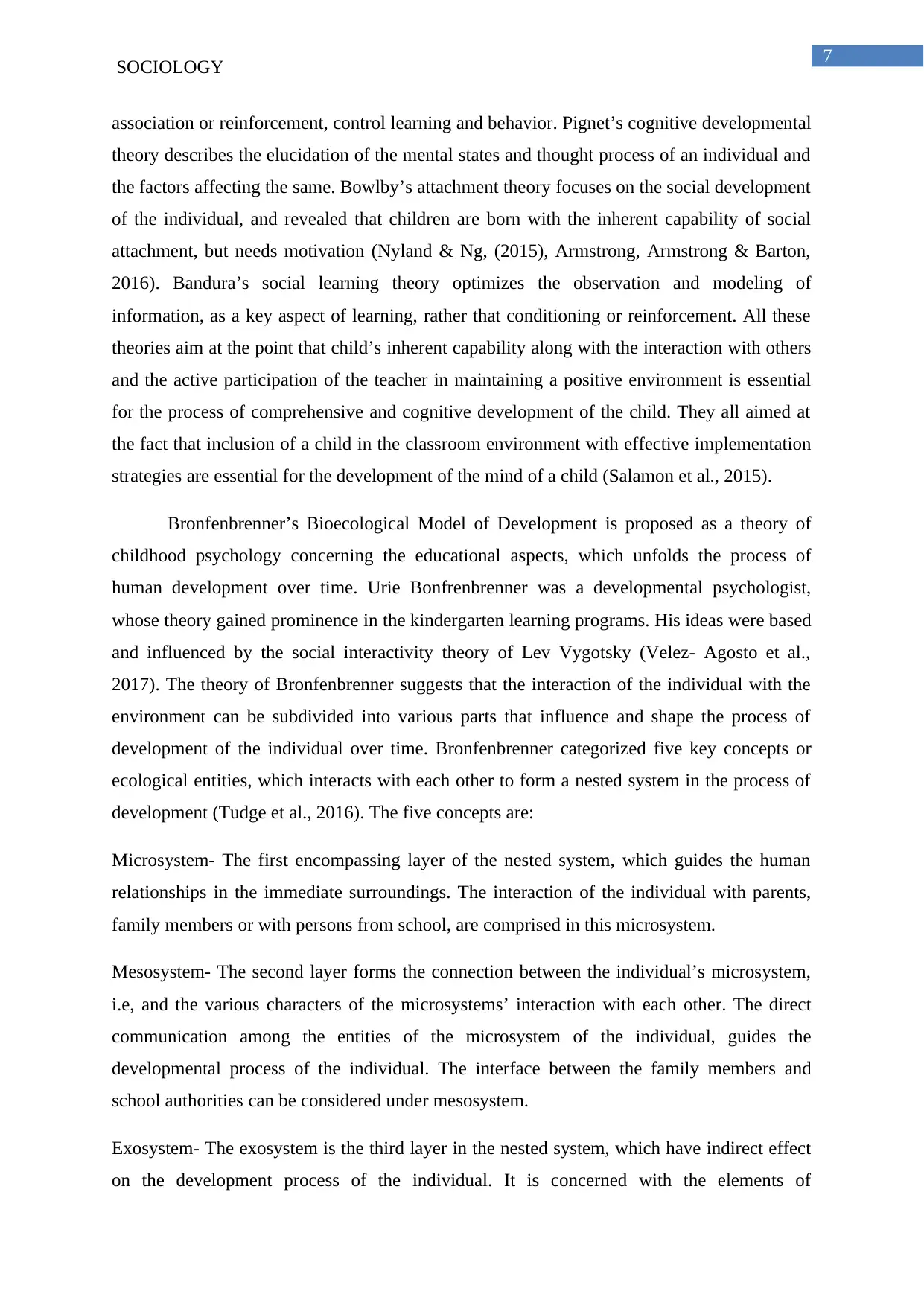
7
SOCIOLOGY
association or reinforcement, control learning and behavior. Pignet’s cognitive developmental
theory describes the elucidation of the mental states and thought process of an individual and
the factors affecting the same. Bowlby’s attachment theory focuses on the social development
of the individual, and revealed that children are born with the inherent capability of social
attachment, but needs motivation (Nyland & Ng, (2015), Armstrong, Armstrong & Barton,
2016). Bandura’s social learning theory optimizes the observation and modeling of
information, as a key aspect of learning, rather that conditioning or reinforcement. All these
theories aim at the point that child’s inherent capability along with the interaction with others
and the active participation of the teacher in maintaining a positive environment is essential
for the process of comprehensive and cognitive development of the child. They all aimed at
the fact that inclusion of a child in the classroom environment with effective implementation
strategies are essential for the development of the mind of a child (Salamon et al., 2015).
Bronfenbrenner’s Bioecological Model of Development is proposed as a theory of
childhood psychology concerning the educational aspects, which unfolds the process of
human development over time. Urie Bonfrenbrenner was a developmental psychologist,
whose theory gained prominence in the kindergarten learning programs. His ideas were based
and influenced by the social interactivity theory of Lev Vygotsky (Velez- Agosto et al.,
2017). The theory of Bronfenbrenner suggests that the interaction of the individual with the
environment can be subdivided into various parts that influence and shape the process of
development of the individual over time. Bronfenbrenner categorized five key concepts or
ecological entities, which interacts with each other to form a nested system in the process of
development (Tudge et al., 2016). The five concepts are:
Microsystem- The first encompassing layer of the nested system, which guides the human
relationships in the immediate surroundings. The interaction of the individual with parents,
family members or with persons from school, are comprised in this microsystem.
Mesosystem- The second layer forms the connection between the individual’s microsystem,
i.e, and the various characters of the microsystems’ interaction with each other. The direct
communication among the entities of the microsystem of the individual, guides the
developmental process of the individual. The interface between the family members and
school authorities can be considered under mesosystem.
Exosystem- The exosystem is the third layer in the nested system, which have indirect effect
on the development process of the individual. It is concerned with the elements of
SOCIOLOGY
association or reinforcement, control learning and behavior. Pignet’s cognitive developmental
theory describes the elucidation of the mental states and thought process of an individual and
the factors affecting the same. Bowlby’s attachment theory focuses on the social development
of the individual, and revealed that children are born with the inherent capability of social
attachment, but needs motivation (Nyland & Ng, (2015), Armstrong, Armstrong & Barton,
2016). Bandura’s social learning theory optimizes the observation and modeling of
information, as a key aspect of learning, rather that conditioning or reinforcement. All these
theories aim at the point that child’s inherent capability along with the interaction with others
and the active participation of the teacher in maintaining a positive environment is essential
for the process of comprehensive and cognitive development of the child. They all aimed at
the fact that inclusion of a child in the classroom environment with effective implementation
strategies are essential for the development of the mind of a child (Salamon et al., 2015).
Bronfenbrenner’s Bioecological Model of Development is proposed as a theory of
childhood psychology concerning the educational aspects, which unfolds the process of
human development over time. Urie Bonfrenbrenner was a developmental psychologist,
whose theory gained prominence in the kindergarten learning programs. His ideas were based
and influenced by the social interactivity theory of Lev Vygotsky (Velez- Agosto et al.,
2017). The theory of Bronfenbrenner suggests that the interaction of the individual with the
environment can be subdivided into various parts that influence and shape the process of
development of the individual over time. Bronfenbrenner categorized five key concepts or
ecological entities, which interacts with each other to form a nested system in the process of
development (Tudge et al., 2016). The five concepts are:
Microsystem- The first encompassing layer of the nested system, which guides the human
relationships in the immediate surroundings. The interaction of the individual with parents,
family members or with persons from school, are comprised in this microsystem.
Mesosystem- The second layer forms the connection between the individual’s microsystem,
i.e, and the various characters of the microsystems’ interaction with each other. The direct
communication among the entities of the microsystem of the individual, guides the
developmental process of the individual. The interface between the family members and
school authorities can be considered under mesosystem.
Exosystem- The exosystem is the third layer in the nested system, which have indirect effect
on the development process of the individual. It is concerned with the elements of
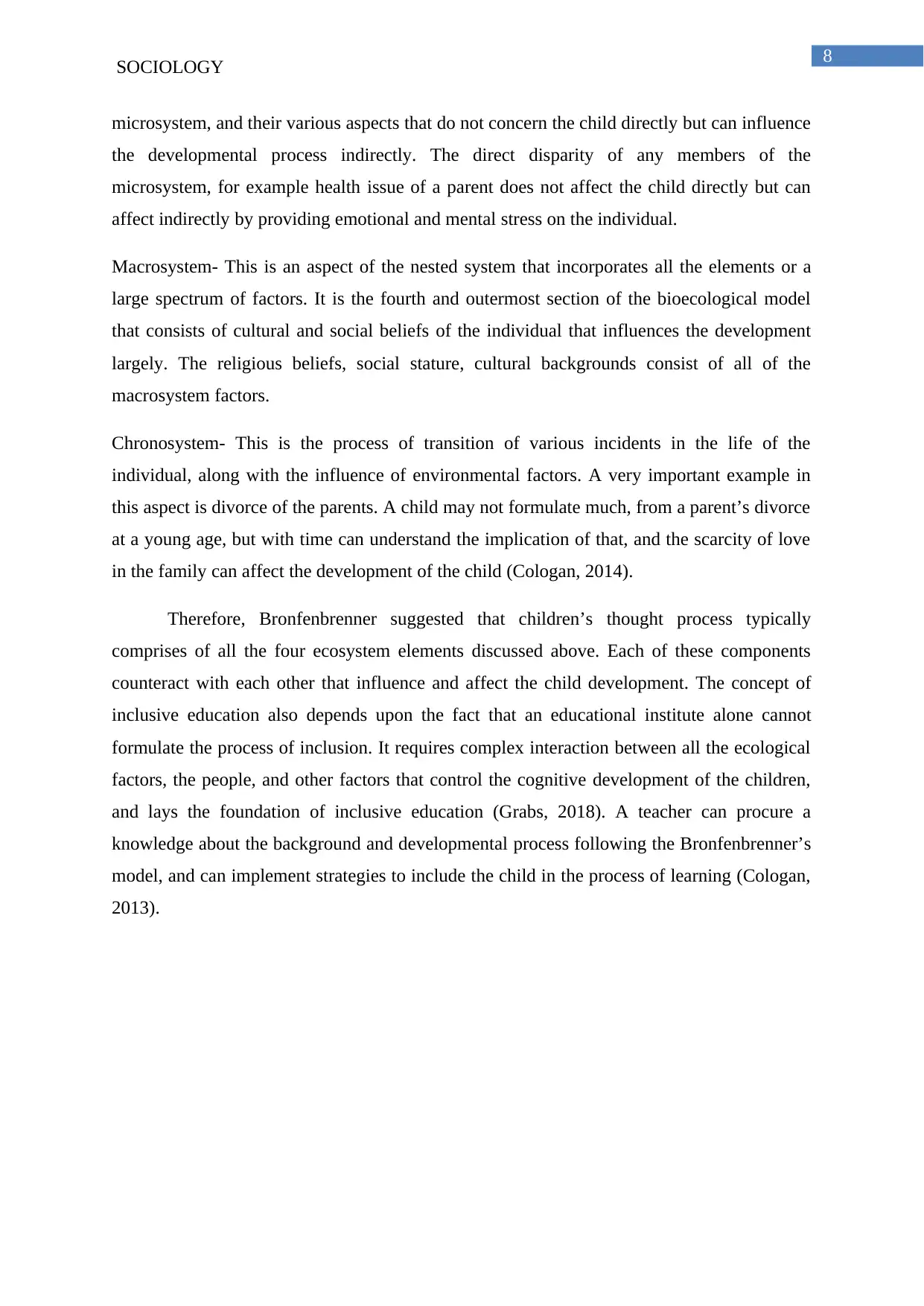
8
SOCIOLOGY
microsystem, and their various aspects that do not concern the child directly but can influence
the developmental process indirectly. The direct disparity of any members of the
microsystem, for example health issue of a parent does not affect the child directly but can
affect indirectly by providing emotional and mental stress on the individual.
Macrosystem- This is an aspect of the nested system that incorporates all the elements or a
large spectrum of factors. It is the fourth and outermost section of the bioecological model
that consists of cultural and social beliefs of the individual that influences the development
largely. The religious beliefs, social stature, cultural backgrounds consist of all of the
macrosystem factors.
Chronosystem- This is the process of transition of various incidents in the life of the
individual, along with the influence of environmental factors. A very important example in
this aspect is divorce of the parents. A child may not formulate much, from a parent’s divorce
at a young age, but with time can understand the implication of that, and the scarcity of love
in the family can affect the development of the child (Cologan, 2014).
Therefore, Bronfenbrenner suggested that children’s thought process typically
comprises of all the four ecosystem elements discussed above. Each of these components
counteract with each other that influence and affect the child development. The concept of
inclusive education also depends upon the fact that an educational institute alone cannot
formulate the process of inclusion. It requires complex interaction between all the ecological
factors, the people, and other factors that control the cognitive development of the children,
and lays the foundation of inclusive education (Grabs, 2018). A teacher can procure a
knowledge about the background and developmental process following the Bronfenbrenner’s
model, and can implement strategies to include the child in the process of learning (Cologan,
2013).
SOCIOLOGY
microsystem, and their various aspects that do not concern the child directly but can influence
the developmental process indirectly. The direct disparity of any members of the
microsystem, for example health issue of a parent does not affect the child directly but can
affect indirectly by providing emotional and mental stress on the individual.
Macrosystem- This is an aspect of the nested system that incorporates all the elements or a
large spectrum of factors. It is the fourth and outermost section of the bioecological model
that consists of cultural and social beliefs of the individual that influences the development
largely. The religious beliefs, social stature, cultural backgrounds consist of all of the
macrosystem factors.
Chronosystem- This is the process of transition of various incidents in the life of the
individual, along with the influence of environmental factors. A very important example in
this aspect is divorce of the parents. A child may not formulate much, from a parent’s divorce
at a young age, but with time can understand the implication of that, and the scarcity of love
in the family can affect the development of the child (Cologan, 2014).
Therefore, Bronfenbrenner suggested that children’s thought process typically
comprises of all the four ecosystem elements discussed above. Each of these components
counteract with each other that influence and affect the child development. The concept of
inclusive education also depends upon the fact that an educational institute alone cannot
formulate the process of inclusion. It requires complex interaction between all the ecological
factors, the people, and other factors that control the cognitive development of the children,
and lays the foundation of inclusive education (Grabs, 2018). A teacher can procure a
knowledge about the background and developmental process following the Bronfenbrenner’s
model, and can implement strategies to include the child in the process of learning (Cologan,
2013).
⊘ This is a preview!⊘
Do you want full access?
Subscribe today to unlock all pages.

Trusted by 1+ million students worldwide
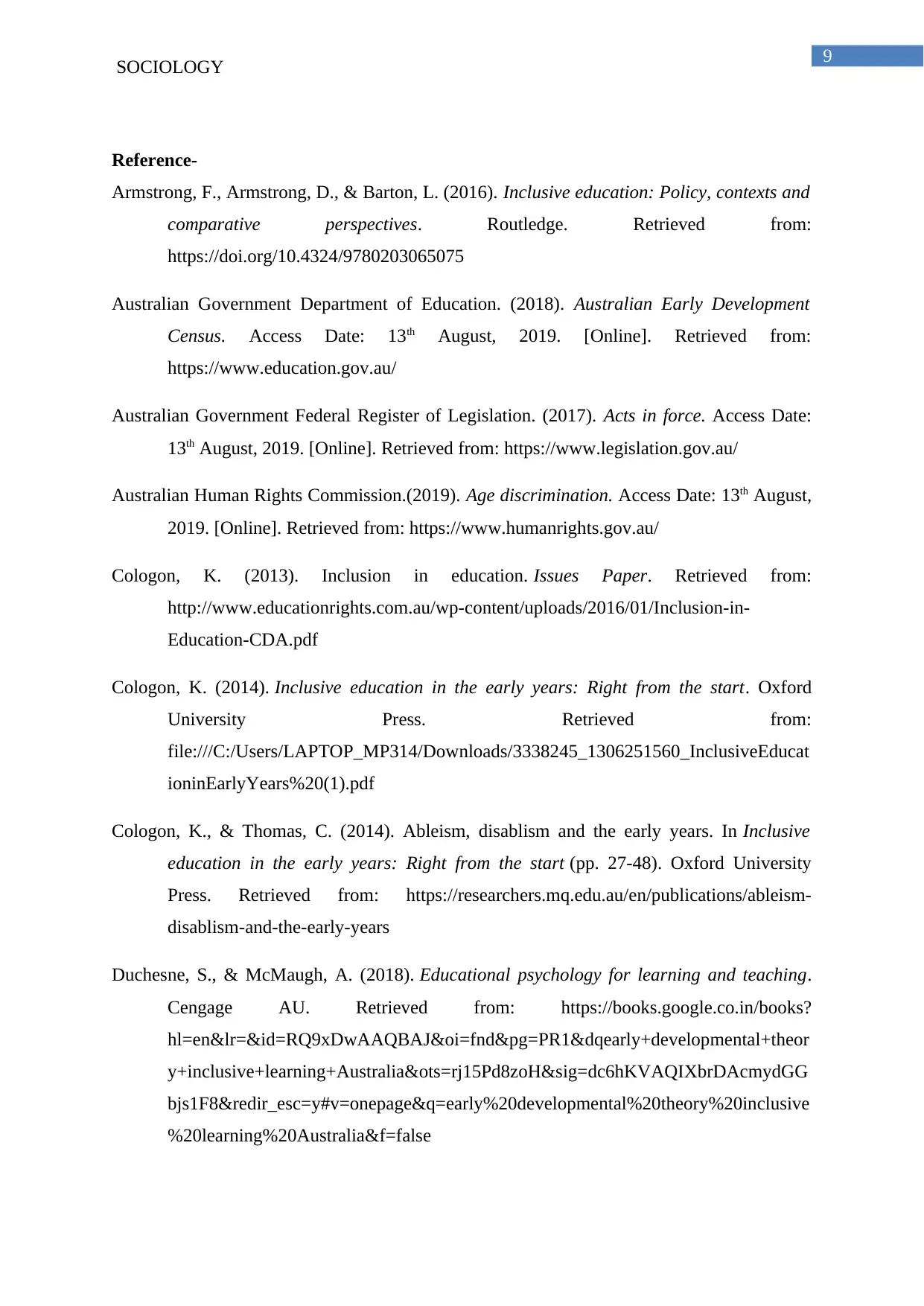
9
SOCIOLOGY
Reference-
Armstrong, F., Armstrong, D., & Barton, L. (2016). Inclusive education: Policy, contexts and
comparative perspectives. Routledge. Retrieved from:
https://doi.org/10.4324/9780203065075
Australian Government Department of Education. (2018). Australian Early Development
Census. Access Date: 13th August, 2019. [Online]. Retrieved from:
https://www.education.gov.au/
Australian Government Federal Register of Legislation. (2017). Acts in force. Access Date:
13th August, 2019. [Online]. Retrieved from: https://www.legislation.gov.au/
Australian Human Rights Commission.(2019). Age discrimination. Access Date: 13th August,
2019. [Online]. Retrieved from: https://www.humanrights.gov.au/
Cologon, K. (2013). Inclusion in education. Issues Paper. Retrieved from:
http://www.educationrights.com.au/wp-content/uploads/2016/01/Inclusion-in-
Education-CDA.pdf
Cologon, K. (2014). Inclusive education in the early years: Right from the start. Oxford
University Press. Retrieved from:
file:///C:/Users/LAPTOP_MP314/Downloads/3338245_1306251560_InclusiveEducat
ioninEarlyYears%20(1).pdf
Cologon, K., & Thomas, C. (2014). Ableism, disablism and the early years. In Inclusive
education in the early years: Right from the start (pp. 27-48). Oxford University
Press. Retrieved from: https://researchers.mq.edu.au/en/publications/ableism-
disablism-and-the-early-years
Duchesne, S., & McMaugh, A. (2018). Educational psychology for learning and teaching.
Cengage AU. Retrieved from: https://books.google.co.in/books?
hl=en&lr=&id=RQ9xDwAAQBAJ&oi=fnd&pg=PR1&dqearly+developmental+theor
y+inclusive+learning+Australia&ots=rj15Pd8zoH&sig=dc6hKVAQIXbrDAcmydGG
bjs1F8&redir_esc=y#v=onepage&q=early%20developmental%20theory%20inclusive
%20learning%20Australia&f=false
SOCIOLOGY
Reference-
Armstrong, F., Armstrong, D., & Barton, L. (2016). Inclusive education: Policy, contexts and
comparative perspectives. Routledge. Retrieved from:
https://doi.org/10.4324/9780203065075
Australian Government Department of Education. (2018). Australian Early Development
Census. Access Date: 13th August, 2019. [Online]. Retrieved from:
https://www.education.gov.au/
Australian Government Federal Register of Legislation. (2017). Acts in force. Access Date:
13th August, 2019. [Online]. Retrieved from: https://www.legislation.gov.au/
Australian Human Rights Commission.(2019). Age discrimination. Access Date: 13th August,
2019. [Online]. Retrieved from: https://www.humanrights.gov.au/
Cologon, K. (2013). Inclusion in education. Issues Paper. Retrieved from:
http://www.educationrights.com.au/wp-content/uploads/2016/01/Inclusion-in-
Education-CDA.pdf
Cologon, K. (2014). Inclusive education in the early years: Right from the start. Oxford
University Press. Retrieved from:
file:///C:/Users/LAPTOP_MP314/Downloads/3338245_1306251560_InclusiveEducat
ioninEarlyYears%20(1).pdf
Cologon, K., & Thomas, C. (2014). Ableism, disablism and the early years. In Inclusive
education in the early years: Right from the start (pp. 27-48). Oxford University
Press. Retrieved from: https://researchers.mq.edu.au/en/publications/ableism-
disablism-and-the-early-years
Duchesne, S., & McMaugh, A. (2018). Educational psychology for learning and teaching.
Cengage AU. Retrieved from: https://books.google.co.in/books?
hl=en&lr=&id=RQ9xDwAAQBAJ&oi=fnd&pg=PR1&dqearly+developmental+theor
y+inclusive+learning+Australia&ots=rj15Pd8zoH&sig=dc6hKVAQIXbrDAcmydGG
bjs1F8&redir_esc=y#v=onepage&q=early%20developmental%20theory%20inclusive
%20learning%20Australia&f=false
Paraphrase This Document
Need a fresh take? Get an instant paraphrase of this document with our AI Paraphraser
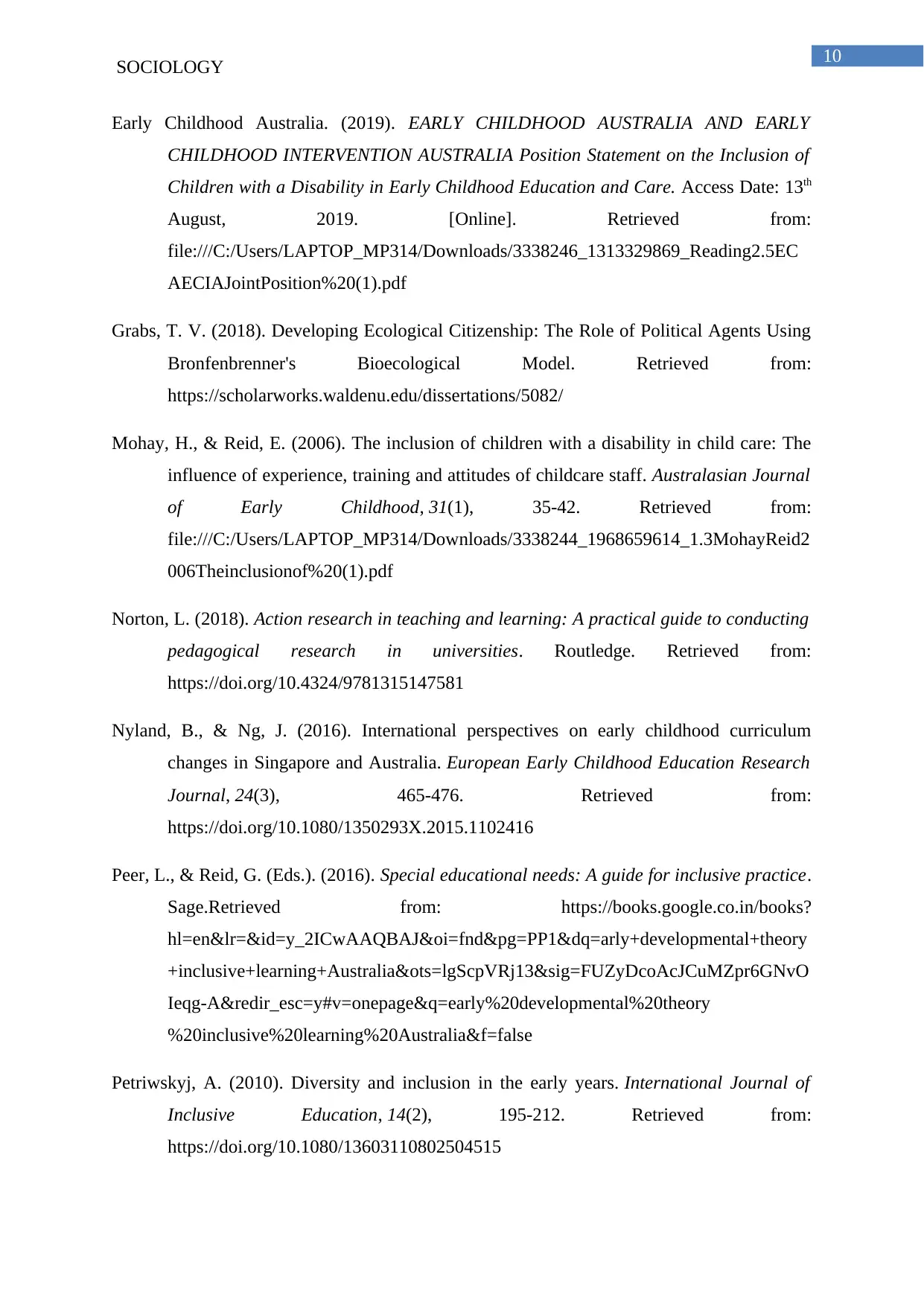
10
SOCIOLOGY
Early Childhood Australia. (2019). EARLY CHILDHOOD AUSTRALIA AND EARLY
CHILDHOOD INTERVENTION AUSTRALIA Position Statement on the Inclusion of
Children with a Disability in Early Childhood Education and Care. Access Date: 13th
August, 2019. [Online]. Retrieved from:
file:///C:/Users/LAPTOP_MP314/Downloads/3338246_1313329869_Reading2.5EC
AECIAJointPosition%20(1).pdf
Grabs, T. V. (2018). Developing Ecological Citizenship: The Role of Political Agents Using
Bronfenbrenner's Bioecological Model. Retrieved from:
https://scholarworks.waldenu.edu/dissertations/5082/
Mohay, H., & Reid, E. (2006). The inclusion of children with a disability in child care: The
influence of experience, training and attitudes of childcare staff. Australasian Journal
of Early Childhood, 31(1), 35-42. Retrieved from:
file:///C:/Users/LAPTOP_MP314/Downloads/3338244_1968659614_1.3MohayReid2
006Theinclusionof%20(1).pdf
Norton, L. (2018). Action research in teaching and learning: A practical guide to conducting
pedagogical research in universities. Routledge. Retrieved from:
https://doi.org/10.4324/9781315147581
Nyland, B., & Ng, J. (2016). International perspectives on early childhood curriculum
changes in Singapore and Australia. European Early Childhood Education Research
Journal, 24(3), 465-476. Retrieved from:
https://doi.org/10.1080/1350293X.2015.1102416
Peer, L., & Reid, G. (Eds.). (2016). Special educational needs: A guide for inclusive practice.
Sage.Retrieved from: https://books.google.co.in/books?
hl=en&lr=&id=y_2ICwAAQBAJ&oi=fnd&pg=PP1&dq=arly+developmental+theory
+inclusive+learning+Australia&ots=lgScpVRj13&sig=FUZyDcoAcJCuMZpr6GNvO
Ieqg-A&redir_esc=y#v=onepage&q=early%20developmental%20theory
%20inclusive%20learning%20Australia&f=false
Petriwskyj, A. (2010). Diversity and inclusion in the early years. International Journal of
Inclusive Education, 14(2), 195-212. Retrieved from:
https://doi.org/10.1080/13603110802504515
SOCIOLOGY
Early Childhood Australia. (2019). EARLY CHILDHOOD AUSTRALIA AND EARLY
CHILDHOOD INTERVENTION AUSTRALIA Position Statement on the Inclusion of
Children with a Disability in Early Childhood Education and Care. Access Date: 13th
August, 2019. [Online]. Retrieved from:
file:///C:/Users/LAPTOP_MP314/Downloads/3338246_1313329869_Reading2.5EC
AECIAJointPosition%20(1).pdf
Grabs, T. V. (2018). Developing Ecological Citizenship: The Role of Political Agents Using
Bronfenbrenner's Bioecological Model. Retrieved from:
https://scholarworks.waldenu.edu/dissertations/5082/
Mohay, H., & Reid, E. (2006). The inclusion of children with a disability in child care: The
influence of experience, training and attitudes of childcare staff. Australasian Journal
of Early Childhood, 31(1), 35-42. Retrieved from:
file:///C:/Users/LAPTOP_MP314/Downloads/3338244_1968659614_1.3MohayReid2
006Theinclusionof%20(1).pdf
Norton, L. (2018). Action research in teaching and learning: A practical guide to conducting
pedagogical research in universities. Routledge. Retrieved from:
https://doi.org/10.4324/9781315147581
Nyland, B., & Ng, J. (2016). International perspectives on early childhood curriculum
changes in Singapore and Australia. European Early Childhood Education Research
Journal, 24(3), 465-476. Retrieved from:
https://doi.org/10.1080/1350293X.2015.1102416
Peer, L., & Reid, G. (Eds.). (2016). Special educational needs: A guide for inclusive practice.
Sage.Retrieved from: https://books.google.co.in/books?
hl=en&lr=&id=y_2ICwAAQBAJ&oi=fnd&pg=PP1&dq=arly+developmental+theory
+inclusive+learning+Australia&ots=lgScpVRj13&sig=FUZyDcoAcJCuMZpr6GNvO
Ieqg-A&redir_esc=y#v=onepage&q=early%20developmental%20theory
%20inclusive%20learning%20Australia&f=false
Petriwskyj, A. (2010). Diversity and inclusion in the early years. International Journal of
Inclusive Education, 14(2), 195-212. Retrieved from:
https://doi.org/10.1080/13603110802504515
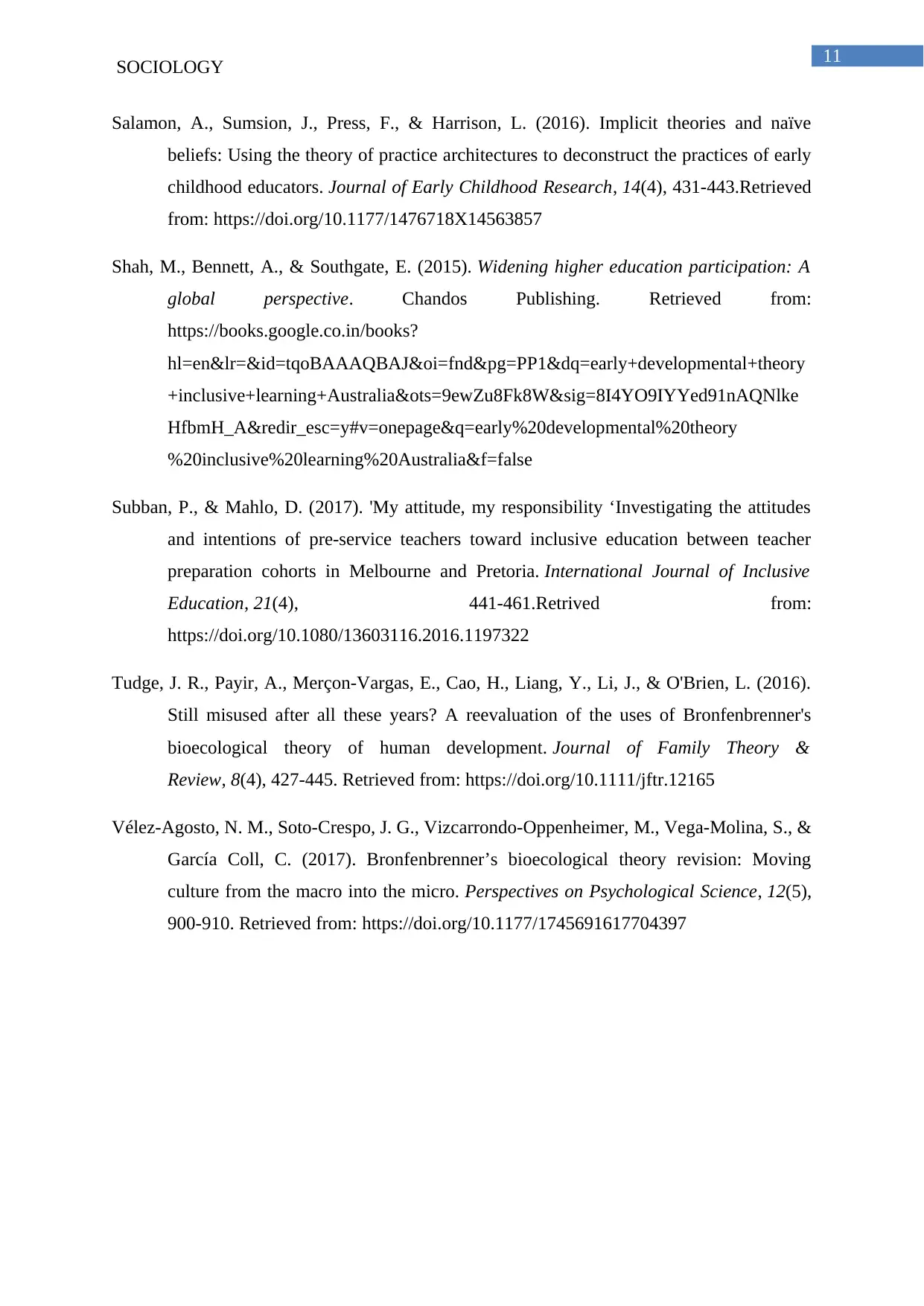
11
SOCIOLOGY
Salamon, A., Sumsion, J., Press, F., & Harrison, L. (2016). Implicit theories and naïve
beliefs: Using the theory of practice architectures to deconstruct the practices of early
childhood educators. Journal of Early Childhood Research, 14(4), 431-443.Retrieved
from: https://doi.org/10.1177/1476718X14563857
Shah, M., Bennett, A., & Southgate, E. (2015). Widening higher education participation: A
global perspective. Chandos Publishing. Retrieved from:
https://books.google.co.in/books?
hl=en&lr=&id=tqoBAAAQBAJ&oi=fnd&pg=PP1&dq=early+developmental+theory
+inclusive+learning+Australia&ots=9ewZu8Fk8W&sig=8I4YO9IYYed91nAQNlke
HfbmH_A&redir_esc=y#v=onepage&q=early%20developmental%20theory
%20inclusive%20learning%20Australia&f=false
Subban, P., & Mahlo, D. (2017). 'My attitude, my responsibility ‘Investigating the attitudes
and intentions of pre-service teachers toward inclusive education between teacher
preparation cohorts in Melbourne and Pretoria. International Journal of Inclusive
Education, 21(4), 441-461.Retrived from:
https://doi.org/10.1080/13603116.2016.1197322
Tudge, J. R., Payir, A., Merçon‐Vargas, E., Cao, H., Liang, Y., Li, J., & O'Brien, L. (2016).
Still misused after all these years? A reevaluation of the uses of Bronfenbrenner's
bioecological theory of human development. Journal of Family Theory &
Review, 8(4), 427-445. Retrieved from: https://doi.org/10.1111/jftr.12165
Vélez-Agosto, N. M., Soto-Crespo, J. G., Vizcarrondo-Oppenheimer, M., Vega-Molina, S., &
García Coll, C. (2017). Bronfenbrenner’s bioecological theory revision: Moving
culture from the macro into the micro. Perspectives on Psychological Science, 12(5),
900-910. Retrieved from: https://doi.org/10.1177/1745691617704397
SOCIOLOGY
Salamon, A., Sumsion, J., Press, F., & Harrison, L. (2016). Implicit theories and naïve
beliefs: Using the theory of practice architectures to deconstruct the practices of early
childhood educators. Journal of Early Childhood Research, 14(4), 431-443.Retrieved
from: https://doi.org/10.1177/1476718X14563857
Shah, M., Bennett, A., & Southgate, E. (2015). Widening higher education participation: A
global perspective. Chandos Publishing. Retrieved from:
https://books.google.co.in/books?
hl=en&lr=&id=tqoBAAAQBAJ&oi=fnd&pg=PP1&dq=early+developmental+theory
+inclusive+learning+Australia&ots=9ewZu8Fk8W&sig=8I4YO9IYYed91nAQNlke
HfbmH_A&redir_esc=y#v=onepage&q=early%20developmental%20theory
%20inclusive%20learning%20Australia&f=false
Subban, P., & Mahlo, D. (2017). 'My attitude, my responsibility ‘Investigating the attitudes
and intentions of pre-service teachers toward inclusive education between teacher
preparation cohorts in Melbourne and Pretoria. International Journal of Inclusive
Education, 21(4), 441-461.Retrived from:
https://doi.org/10.1080/13603116.2016.1197322
Tudge, J. R., Payir, A., Merçon‐Vargas, E., Cao, H., Liang, Y., Li, J., & O'Brien, L. (2016).
Still misused after all these years? A reevaluation of the uses of Bronfenbrenner's
bioecological theory of human development. Journal of Family Theory &
Review, 8(4), 427-445. Retrieved from: https://doi.org/10.1111/jftr.12165
Vélez-Agosto, N. M., Soto-Crespo, J. G., Vizcarrondo-Oppenheimer, M., Vega-Molina, S., &
García Coll, C. (2017). Bronfenbrenner’s bioecological theory revision: Moving
culture from the macro into the micro. Perspectives on Psychological Science, 12(5),
900-910. Retrieved from: https://doi.org/10.1177/1745691617704397
⊘ This is a preview!⊘
Do you want full access?
Subscribe today to unlock all pages.

Trusted by 1+ million students worldwide
1 out of 12
Related Documents
Your All-in-One AI-Powered Toolkit for Academic Success.
+13062052269
info@desklib.com
Available 24*7 on WhatsApp / Email
![[object Object]](/_next/static/media/star-bottom.7253800d.svg)
Unlock your academic potential
Copyright © 2020–2026 A2Z Services. All Rights Reserved. Developed and managed by ZUCOL.




